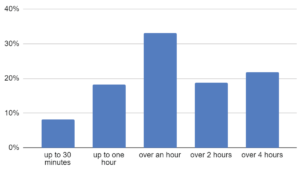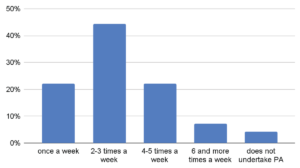Physical Activity and Lifestyle of Female Students at the Faculty of Health Sciences, University of Applied Sciences in Tarnów, Poland
The Impact of Physical Activity on the Lifestyle of Female Students at the Faculty of Health Sciences, Tarnów
Introduction
The importance of physical activity in promoting mental and physical health cannot be overstated. In recent years, there has been increasing recognition of the profound impact that lifestyle choices have on overall well-being, particularly among students in the field of health sciences. In this blog post, we explore the findings of a recent study conducted among female students of the Faculty of Health Sciences (FHS) at the University of Applied Sciences in Tarnów, Poland, which investigates the relationship between physical activity and lifestyle choices. This study highlights not only the physical and social benefits of an active lifestyle but also touches on the psychological implications of such behaviors, with a focus on how Psychiatry plays a role in understanding and supporting mental health in the context of stress management and self-care.

Figure 1: Time spent on physical activity during the week by female students of FHS in Tarnow (n = 167, data in %).
The study surveyed 167 female students from a variety of health-related programs, including physiotherapy, nursing, physical education, and cosmetology. It evaluated their physical activity, eating habits, alcohol consumption, sleep patterns, and stress management practices. The study sought to explore how these factors are influenced by the students’ field of study and their year of study, as well as their perception of health and well-being.
The Importance of Physical Activity in Health and Well-being
According to the World Health Organization (WHO), physical activity is crucial for maintaining physical, mental, and social well-being. For adults, the WHO recommends 150–300 minutes of moderate-intensity aerobic activity per week, which can significantly reduce the risk of chronic diseases, improve mental health, and enhance overall quality of life. Regular physical activity not only strengthens the body but also has a profound impact on the mind, reducing the symptoms of stress, anxiety, and depression.

Figure 2: Frequency of physical activity by female students of FHS in Tarnow (n = 167, data in %).
For the female students surveyed, physical activity was shown to be a central component of their lifestyle choices, with the majority of them engaging in regular exercise routines. However, the study also revealed that physical activity was not consistent across all fields of study. Female students studying physical education were found to be the most active, suggesting that their field of study may influence their overall approach to health and fitness. These findings underscore the importance of a holistic approach to health promotion, where physical activity is integrated with mental health support to improve psychological resilience.
In the context of Psychiatry, the positive impact of exercise on mental health is well-documented. Physical activity has been shown to reduce levels of stress hormones like cortisol, while also boosting the production of endorphins, which are natural mood elevators. This underscores the connection between physical and mental health and highlights the growing importance of addressing both aspects in health education and prevention strategies.
Lifestyle Factors and Their Impact on Mental Health
In addition to physical activity, lifestyle choices—including eating habits, stress management, and sleep patterns—are key determinants of overall well-being. The study found that the vast majority of female students were conscious of their health and believed that maintaining a healthy lifestyle was crucial for their future profession. Psychiatry plays a significant role in helping individuals manage their lifestyle choices, particularly in how they handle stress and emotions.

Figure: 3 The most common forms of physical activity undertaken by female students (n = 167, data in %).
Eating Habits
The study revealed that 83% of the female students paid attention to their eating habits, but only 40% of them controlled their caloric intake. Interestingly, 36% of the students reported using dietary supplements. The focus on nutrition aligns with mental health theories in Psychiatry, which emphasize the role of diet in influencing mood and cognitive function. Research has shown that balanced nutrition is essential for maintaining brain health, which in turn supports mental clarity, focus, and overall psychological resilience.
Sleep Patterns
Adequate sleep is another cornerstone of a healthy lifestyle. The study found that most students slept between 7-8 hours per night, a range that aligns with Psychiatry‘s recommendations for healthy sleep. Insufficient sleep has been linked to increased stress, depression, and anxiety, while regular, quality sleep enhances cognitive function and emotional regulation. Psychiatry views sleep as a critical factor in mental health recovery and stress management, as it plays a significant role in emotional stability.
Stress Management
Another key finding from the survey was the role of stress management in the students’ lifestyles. While 50% of the female students reported managing stress effectively, 20% struggled with stress, and the remaining 30% did not have a clear strategy for managing stress. This points to the psychological importance of developing coping mechanisms for dealing with academic pressure, personal challenges, and future professional responsibilities. Psychiatry emphasizes the importance of stress management techniques such as mindfulness, cognitive behavioral therapy (CBT), and relaxation exercises for managing chronic stress.
Psychiatry’s Role in Promoting Health-Promoting Behaviors
In the context of this study, Psychiatry plays a vital role in supporting mental well-being by addressing the psychosocial factors that influence physical activity and other lifestyle behaviors. For students in health-related fields, understanding the connection between physical health and mental health is crucial. The integration of psychological theories and biological knowledge can help improve overall health outcomes, as students learn to manage both physical exertion and mental resilience.
By incorporating Psychiatry principles into health education curricula, students can gain a better understanding of how their mental health impacts their physical health and vice versa. This holistic approach helps prepare future health professionals to address both aspects in their patients, ensuring comprehensive care.
Mental Health Awareness and Stress in Academic Settings
The demands of academic life can contribute significantly to student stress, which is why the study emphasized the importance of physical activity as a tool for stress reduction. Future health professionals, especially those studying in fields like psychology, nursing, and physiotherapy, should be equipped with skills to manage both their stress levels and their patients’ psychological well-being.
Through regular engagement in physical activity, students can reduce their stress levels, which in turn enhances their academic performance and overall mental health. Psychiatry teaches that regular physical exercise can improve mood and cognitive function, which is vital for coping with the pressures of academic life and future professional responsibilities.
The Influence of Field of Study on Physical Activity and Lifestyle
One of the most interesting findings from this study was the significant difference in physical activity levels among students from different fields of study. Female students studying physical education were the most active, followed by physiotherapy students. This suggests that the field of study plays an important role in shaping students’ attitudes toward health and fitness.
In Psychiatry, it is well-established that profession-related stress can impact mental health, but it is also recognized that a person’s career choice and lifestyle decisions can provide opportunities for psychological well-being. For example, students in health-related programs may be more inclined to adopt health-promoting behaviors because of their education, which increases their awareness of the connection between physical activity, mental health, and professional efficacy.
Conclusion
The study of physical activity and lifestyle among female students of the Faculty of Health Sciences at the University of Applied Sciences in Tarnów provides valuable insights into the importance of physical activity as part of a holistic health-promoting lifestyle. Through the integration of Psychiatry into health education programs, students are better equipped to handle stress, promote mental well-being, and maintain an active and healthy lifestyle. The findings emphasize the importance of physical activity as an essential component of overall health, not only for personal benefit but also as a professional responsibility for future healthcare providers.
Moving forward, it is important to continue integrating Psychiatry and mental health education into the curricula of health-related programs to foster a comprehensive understanding of how physical activity and mental health are interconnected. By doing so, we can ensure that future healthcare professionals are better equipped to manage their own health while promoting mental wellness in their patients.
FAQ’s :
How does physical activity affect mental health?
A:Physical activity reduces stress and enhances mood by increasing endorphins, helping to improve overall mental well-being.What role does Psychiatry play in lifestyle choices?
A: Psychiatry helps understand the connection between mental health and lifestyle, providing strategies to manage stress and promote well-being.How does physical activity help students manage stress?
A: Regular exercise helps students reduce stress and improve mental health, boosting focus and academic performance.What are the benefits of physical activity for female students?
A: Physical activity promotes physical health, enhances mental clarity, and provides a tool for coping with stress during academic life.Why is mental health education important in health programs?
A: Mental health education, especially in Psychiatry, equips students to understand the mind-body connection, improving well-being and professional care.
